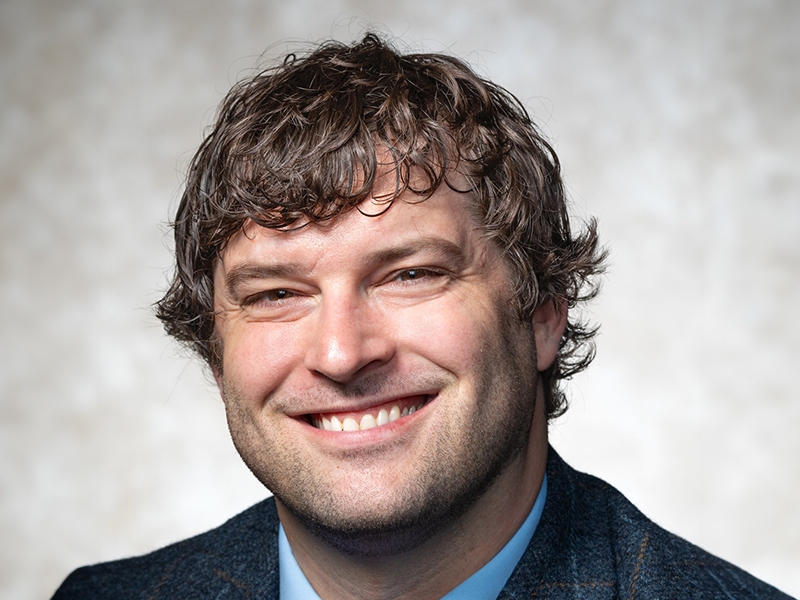
An agricultural economist with the U of A System Division of Agriculture was recently named the Southern Sustainable Agriculture Research and Education Fellow, a two-year program focused on sustainable agriculture efforts nationwide.
Trey Malone, assistant professor of agricultural economics and agribusiness, is among four new regional representatives for the program created in 2007 to provide immersive education and research opportunities with farmers and ranchers. Sustainable Agriculture Research and Education, also known as SARE, was established in 1988 by the U.S. Department of Agriculture.
Malone conducts research through the Arkansas Agricultural Experiment Station, the research arm of the Division of Agriculture, and teaches with the Dale Bumpers College of Agricultural, Food and Life Sciences at the U of A. During the competitive annual selection process, one fellow is chosen from each SARE region: Northeast, North Central, Western and Southern.
"It's exciting to gain firsthand insight into this aspect of sustainability," Malone said. "I've done research with SARE grants before, but this is a new approach. This is an opportunity for boots-on-the-ground learning about what other regions in the country are doing to promote sustainability in agriculture."
Home to Walmart, Tyson Foods, Simmons Foods and half of the nation's rice production, Arkansas is "ground zero" for potential innovation in sustainable agriculture, Malone said.
"Arkansas is an agricultural hot spot in the backyard of the world's largest and fourth-largest grocery stores, so if you are ever going to transform agriculture to be more sustainable, this is ground zero where that needs to happen," Malone said. "If you want to really change the food system, you have to engage with important players like Walmart, Sam's Club and the large commercial-scale farmers in the Delta."
Having served as the Farm Foundation's Fellow for Sustainable Food Systems since January, Malone is now in a unique position to provide research on agricultural sustainability issues for stakeholders and consumers on national and global stages. In September, for example, Malone attended a meeting with United States trade partners at the U.S. Embassy in Paris about climate policy and sustainability. He will make a return trip to Europe next month to discuss these matters further at the Paris-based Organization for Economic Cooperation and Development.
"Global farm policy matters for U.S. producers because of the importance of exports - what we export is a function of what they allow us to export," Malone said. "So, if other countries pass certain sustainability policies we don't adhere to, then we lose that market."
While the Farm Foundation fellowship research is focused on global innovation in sustainability policy, the SARE program is targeted at what farmers are doing, or could be doing, to increase sustainability on their farms, Malone said. The coinciding fellowships provide the unique ability for one researcher to link domestic practices to international market opportunities.
"This adds another arrow to the quiver in terms of understanding how we might be able to profitably improve sustainability in the food system," Malone said of the SARE program.
As a SARE Fellow, Malone will tour farms and ranches in other parts of the country over the next two years to learn what is happening in different regions to improve sustainability. He will also explore ways the practices might be implemented in the South's unique environment.
The fellowship concludes with a "super conference" at the National Association of County Agricultural Agents, where the four SARE fellows will present their findings on sustainability ideas.
"In a world where the large farms keep getting larger, and the mid-size farms keep going out of business, profitability has to be a primary focus," Malone said. "The question is how we maintain profitability while preserving the planet, and the food system plays a large role in that conversation. All of this is tied up in finding innovative, entrepreneurial ways to maintain profitability but also to reduce food waste, preserve soil health and reduce carbon emissions."
Learn more about Malone and his work.
To learn more about Division of Agriculture research, visit the Arkansas Agricultural Experiment Station website: https://aaes.uada.edu. Follow on Twitter at @ArkAgResearch. To learn more about the Division of Agriculture, visit https://uada.edu/. Follow us on Twitter at @AgInArk. To learn about extension programs in Arkansas, contact your local Cooperative Extension Service agent or visit www.uaex.uada.edu.
About the Division of Agriculture: The University of Arkansas System Division of Agriculture's mission is to strengthen agriculture, communities, and families by connecting trusted research to the adoption of best practices. Through the Agricultural Experiment Station and the Cooperative Extension Service, the Division of Agriculture conducts research and extension work within the nation's historic land grant education system. The Division of Agriculture is one of 20 entities within the University of Arkansas System. It has offices in all 75 counties in Arkansas and faculty on five system campuses. The University of Arkansas System Division of Agriculture offers all its Extension and Research programs and services without regard to race, color, sex, gender identity, sexual orientation, national origin, religion, age, disability, marital or veteran status, genetic information, or any other legally protected status, and is an Affirmative Action/Equal Opportunity Employer.
Topics
Contacts
John Lovett, project/program specialist
Agricultural Communication Services
479-763-5929,